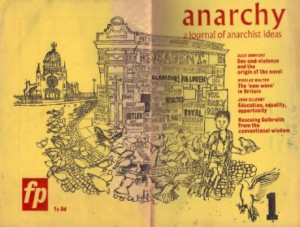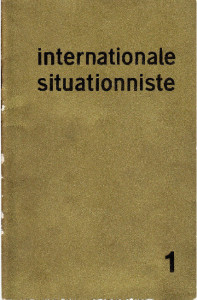L’Internationale situationniste produit ses travaux théoriques dans sa revue Internationale situationniste. La revue fut également rédigée par Guy Debord, Mohamed Dahou, Giuseppe Pinot-Gallizio, Maurice Wyckaert, Constant, Asger Jorn, Helmut Sturm, Attila Kotanyi, Jørgen Nash, Uwe Lausen, Raoul Vaneigem, Michèle Bernstein, Jeppesen Victor Martin, Jan Stijbosch, Alexander Trocchi, Théo Frey, Mustapha Khayati, Donald Nicholson-Smith, René Riesel, René Viénet, etc. 12 numéros furent publiés entre 1958 et 1969. Cette revue était un terrain d’expérimentation discursif et également un moyen de propagande.
Continue reading Internationale situationniste , intégrale des 12 numéros de la revue parus entre 1958 et 1969
Tag Archives: 1963
Biografía de Carlos Soriano Águila (1905-1980), ferroviario y anarquista
El 14 de mayo de 1980 muere en Granada (Andalucía, España) el anarquista y anarcosindicalista Carlos Soriano Águila. Había nacido el 2 de abril de 1905 en Palenciana (Córdoba, Andalucía, España). Hijo de un comerciante socialista de clase media, cuando tenía 12 años dejó el pueblo y se fue a vivir con su tío Miguel, ferroviario y jefe de la estación de Las Mellizas (Álora, Málaga, Andalucía, España), viudo y sin hijos. En Alora conoció la que luego sería su primera esposa en 1930. Entre diciembre de 1921 y 1923 estudió en la Academia de Factores Ferroviarios y entre 1923 y 1925 trabajó como factor provisional en la Compañía de Ferrocarriles Andaluces en Écija (Sevilla, Andalucía, España), donde entró en contacto con el movimiento anarquista. Los servicios en Écija le sirvieron para hacer el servicio militar. A partir de 1925 pasó a trabajar en la estación de Bobadilla (Antequera, Málaga, Andalucía, España) y 1928 se afilió al Sindicato Autónomo de Factores (SAF), bastante influido por la Confederación Nacional del Trabajo (CNT). En 1928 el SAF ingresó en la CNT.
Continue reading Biografía de Carlos Soriano Águila (1905-1980), ferroviario y anarquista
Actos de homenaje a Francisco Granado Gata. 17 y 18 de octubre de 2015 en Valencia del Ventoso (Badajoz)
Con motivo del ochenta aniversario del nacimiento de Francisco Granada Gata, en Valencia del Ventoso, los próximos días 17 y 18 de octubre de 2015, la Asociación para la Recuperación de la Memoria Histórica de Extremadura (ARMHEX), junto con la la familia Granado-Vaquerizo, con el apoyo del Ayuntamiento de Valencia del Ventoso, y la colaboración de la Confederación Nacional del Trabajo (CNT-Extremadura) y la Confederación General de Trabajo (CGT), se van a organizar, una serie de actos en reparación de la memoria de Francisco Granado Gata (1935-1963), asesinado tras ser condenado injustamente en un Consejo de Guerra franquista, en 1963, por un delito que no cometió.
Continue reading Actos de homenaje a Francisco Granado Gata. 17 y 18 de octubre de 2015 en Valencia del Ventoso (Badajoz)
ANARCHY n. 1/3/4/5/23/40/118
Basic Banalities (1963)
Raoul Vaneigem
Part I
1
Bureaucratic capitalism has found its legitimation in Marx. I am not referring here to orthodox Marxism’s dubious merit of having reinforced the neocapitalist structures whose present reorganization is an implicit homage to Soviet totalitarianism; I am emphasizing the extent to which Marx’s most profound analyses of alienation have been vulgarized in the most commonplace facts, which, stripped of their magical veil and materialized in each gesture, have become the sole substance, day after day, of the lives of an increasing number of people. In a word, bureaucratic capitalism contains the palpable reality of alienation; it has brought it home to everybody far more successfully than Marx could ever have hoped to do, it has banalized it as the diminishing of material poverty has been accompanied by a spreading mediocrity of existence.
Continue reading Basic Banalities (1963)
Basic Banalities
Raoul Vaneigem
Part I
1
Bureaucratic capitalism has found its legitimation in Marx. I am not referring here to orthodox Marxism’s dubious merit of having reinforced the neocapitalist structures whose present reorganization is an implicit homage to Soviet totalitarianism; I am emphasizing the extent to which Marx’s most profound analyses of alienation have been vulgarized in the most commonplace facts, which, stripped of their magical veil and materialized in each gesture, have become the sole substance, day after day, of the lives of an increasing number of people. In a word, bureaucratic capitalism contains the palpable reality of alienation; it has brought it home to everybody far more successfully than Marx could ever have hoped to do, it has banalized it as the diminishing of material poverty has been accompanied by a spreading mediocrity of existence. As poverty has been reduced in terms of mere material survival, it has become more profound in terms of our way of life — this is at least one widespread feeling that exonerates Marx from all the interpretations a degenerate Bolshevism has derived from him. The “theory” of peaceful coexistence has accelerated such an awareness and revealed, to those who were still confused, that exploiters can get along quite well with each other despite their spectacular divergences.
HÉLÈNE BRION (1882-1962)
Article d’H. Dubief paru dans Le Mouvement social (été 1963) publié sur le site Bataille socialiste.
Per la critica del lavoro
Günther Anders
[…]
Per proletariato s’intendeva, cent’anni fa, quella massa di persone che dovevano vendere il loro tempo di lavoro e la loro forza di lavoro, e che non erano proprietari dei loro mezzi di produzione e della maggioranza dei loro prodotti. Oggi noi (anche quando, come salariati o stipendiati, possediamo un’automobile, un frigorifero, ecc.) siamo non proprietari in un senso molto più pauroso. Poiché non siamo proprietari dello scopo del nostro lavoro e degli effetti del nostro lavoro. Con ciò non voglio dire soltanto che, nel nostro lavoro, non vediamo davanti a noi il prodotto finito, la sua finalità e il suo impiego; ma che essi non possono e non devono interessarci in alcun modo.
Continue reading Per la critica del lavoro
EL MAQUIS A CATALUNYA 1939-1963. – La represión del maquis (video)
REPORTAJE
EL MAQUIS A CATALUNYA 1939-1963.
Ricard Vargas Golarons.
CAPITULO PRIMERO
SURGIMIENTO DEL MAQUIS
Continue reading EL MAQUIS A CATALUNYA 1939-1963. – La represión del maquis (video)
Internationale Situationniste (n.1 to 12)
Edited by G.-E. Debord. Paris, 1958-1969. 12 Numbers.
Continue reading Internationale Situationniste (n.1 to 12)









